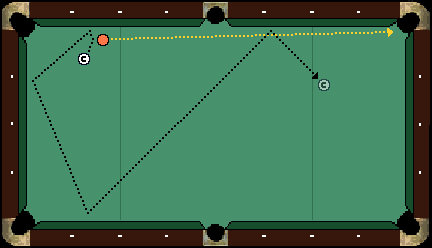Make That Ball!!
| by Jim Meador

Harry would stare at me with his mouth open. "Why can't you make that ball? Shoot the damned thing in the pocket!"
Willie Mosconi was right: "Don't miss!" His response to the secret of great pool just seems too simplistic, but greatness is more often a matter of simplicity than of complexity. Sometimes I believe the old masters had an advantage. The world, and life in general was less complex. I appreciate the works of the 19th century painters much more than do those my contemporaries. There was a purity in color, brush stroke and composition that seems to be missing in today's works. Art is, after all, a reflection of life, and life in the 19th century was less cluttered. I believe this can be related to billiards.
The information age provides instant access to everything, but purity of action and thought has been corrupted and polluted by the extraneous. With easy access to instructional books, tapes and internet advice, pool players today are learning about squirt, throw, and a myriad of other dynamics that affect the game of pool. On the surface, that may seem like an advantage. But is it? I think not. The following may offer a reason for my opinion.
I was practicing alone one evening at the Obelisk Billiard Club in Newport News, VA. Harry Crabtree happened by, and seated himself next to my table. We chatted casually while I was shooting, and occasionally Harry would frown at one of my shots. Finally I said,"Harry, show me some shots." Harry pulled himself slowly from the chair, took my stick and set up the balls. "Now, I want you to make this ball in that corner pocket down there (he pointed with the stick), and draw the cueball around the table for position on the ball at the other end." To make sure I understood, he executed the shot himself.
I attempted the shot a half dozen times, and from the start had no difficulty drawing the cueball around the table as instructed. I just couldn't make the object ball. Each time I missed, Harry would stare at me with his mouth open. "Why can't you make that ball? Shoot the damned thing in the pocket!" I was getting frustrated. "I'm trying Harry! It's throwing and I'm compensating too much!" Harry shook his head and frowned. "Throwing? Throwing!? Forget throwing! You're just missing the damned thing," he insisted. "Make the ball! Position is no good if you miss! Forget that throw crap and aim at the ball."
I tried again with the same irritating result. In fact, it was getting worse. Harry took the stick from my hand with disgust. "Look here!" He bent over the table, wrapped his stubby, old finger around the shaft, took one warm up stroke, and pocketed the ball dead center of the pocket. The cueball spun perfectly around three rails and came to rest precisely where intended. "Why can't you do that? I can't understand why you can't make that ball!"
Well, I knew why I couldn't make that ball.
I knew too much, and was intellectualizing a simple shot into a
complex one. While I was thinking about throw compensation, Harry
focused on making the ball. Harry was a pure shooter. If he knew
about throw and squirt, he never mentioned it. And I believe most
expert shooters are experts, in part, because they don't know enough
not to be. What they do know is how to make the ball they are
shooting at. Because of their confidence in pocketing a ball, they
can invest more brain cells in planning position without blowing a
fuse.
The fact is, since I was trying to spin the cueball around the table, the outside spin I was using for position was all I needed to compensate for throw. Compensation was, in effect, automatic. All I had to do, as Harry said, was "make the damned ball." Since that frustrating experience, I practice the shot, and rarely miss. So, did I learn something from the experience? Probably not. Unfortunately, my brain has been corrupted with the extraneous, and I haven't found a cure.
I am not suggesting that players ignore the information they read regarding the physics of the game. I am suggesting that they allow it to seep in slowly by osmosis and to remain focused on sinking the object ball. With enough practice and competition, and by keeping it simple, the more complex elements will be simplified and homogenized into the game naturally. One of these days I will learn how to practice what I preach. Or maybe I just need to learn how to practice PERIOD. Preaching is another issue.
Most Popular
Jackass Shooting Pool
Syndrome
Physics of Pool
Bumper Pool
The Masse'
Snooker
Topless Sharking
Selecting a Cue Stick
Long and Straight
Trick Shots
Aiming
We Recommend







